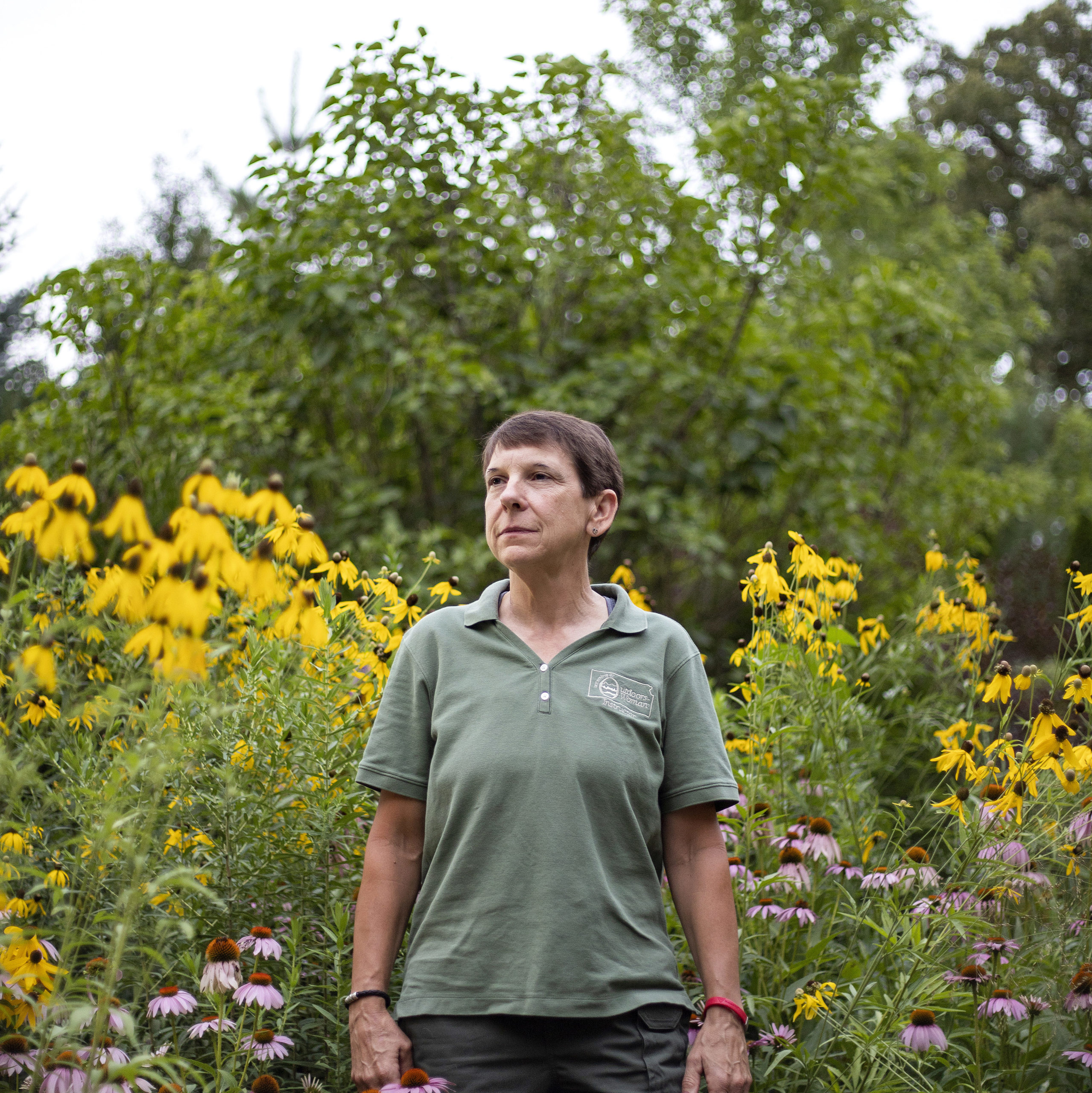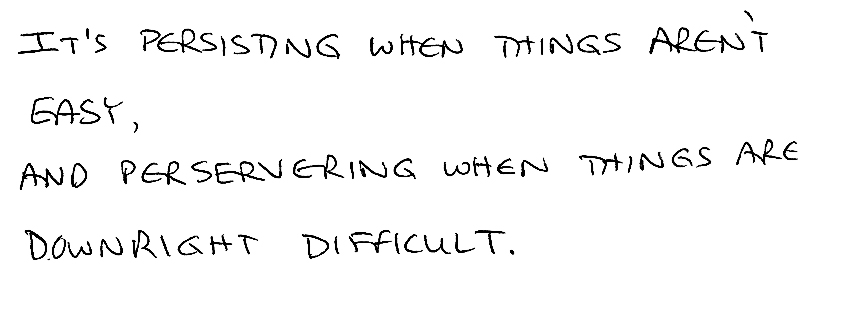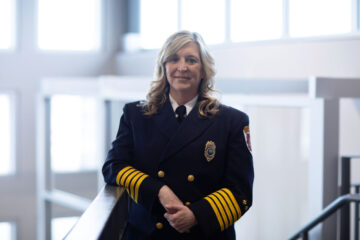
Joli Vollers is a retired Department of Natural Resources conservation officer, where she worked for 30 years. At the time of her retirement, Vollers was one of only a handful of women — out of 90 conservation officers — who held the position. For much of her career, she led training programs for other conservation officers.
Through programs like Outdoor Journey for Girls, Becoming an Outdoors Woman and Women in Science and Engineering at Iowa State University, Vollers is passionate about encouraging young girls and women to play outside and explore careers in the conservation field, despite the challenges they may face.
I never wanted to be a cop. I wanted to be in conservation. I fell into law enforcement because it was a way that I could do hands-on conservation work and talk to people. I was so excited to get into a fun, exciting career where I could make a difference for wildlife and do actual conservation work. After I’d worked for the U.S. Fish and Wildlife Service, the National Park Service in Colorado and the Iowa Conservation Commission, it didn’t occur to me after working for all of those good organizations that I would be looked at or treated any differently as a woman [at the DNR].
People would say, “What’s it like being a woman officer, working with the public?” It’s fine. No biggie. I didn’t face problems being a woman officer with the public. I faced it internally with the agency. It was totally a boys club. I started to figure this out really quick, when I jumped in and decided that this was what I wanted to do.
When I was selected to go through the process of becoming a DNR conservation officer, the interview was a terrifying experience. I was at the end of a long table and all of these people in uniforms and badges were looking at me. They all took turns asking questions, and then they scribbled furiously. I don’t think I even told them what my name was. I must have done well enough because I made it to the next step, which was a physical test where we had to jump over a bunch of obstacles. It’s what Iowa had for any police officer back in the day. It didn’t matter if you were 16 or 60, male or female, we all had to take the same test.
The chief at the time said, “I want you to know, you have to clear an 8-foot wall.” They told me that women never clear the wall. I said, “OK, I can do that,” although I had never tried to clear an 8-foot wall in my life. When I went back to Colorado, I would practice clearing a wall over my lunch hour. We had an 8-foot wall around our compound at our ranger station. I would be in my hiking boots and my NPS ranger outfit and I’d run up to that wall and I’d put a foot on it, grab the top and try to get over it. It was hard. But I just kept doing it over and over until I came back to Iowa for the physical test.
There were easily a couple dozen people there for testing. They put all of our names in a hat to draw to see who would go first. They drew me first. All of the supervisors were there in uniform with clipboards and stopwatches. I got on the line and they called, “Go.” I took off, I got up on that wall, planted one, two feet, grabbed the top and was over it just like that. I jumped on the other side, my future supervisor was on the other side and he looked at me saying, “Keep going!” I finished the whole thing. I felt really pumped about that.
Then later that evening at the Wallace Building, there was a group of us that didn’t get to leave. It was getting late, it was dark outside. We didn’t really know why we had to stick around. The only people in that room were women or people of color. I found out that we all had to go through another interview that the white boys didn’t have to do. We had to sit down with the chief or assistant chief and they’d take us into a cubicle of the division administrator one by one and we’d sit there. What was clear to me was he apparently felt that he was being forced to hire someone other than a white male, so he wanted to give his approval or disapproval to whoever was getting hired.
I don’t know where I had the guts or stupidity at the time, but I remember looking over at the chief and I said, “If me being a woman is going to have anything to do with whether or not I get hired for this position, I don’t want to work here.” He told me that the division administrator just wanted to meet with folks in the protected classes. I remember being very perturbed and disappointed. That should have been a warning right there.
Long story short, I did get hired and I accepted the position. I was so thrilled, excited and psyched.
Then I went to the law enforcement academy. I was in there with Sioux City police officers, DNR officers, DOT officers and other police from all over the state. We had less than 10% women in the class of about 35 people. But we had women in the class, which I thought was cool. The psychologist had a little chitchat with us one day. She said, “I’d like to see a show of hands from the guys. Who in here would have a problem working with a female officer?” I thought, “What the hell is she doing this for?” Three-quarters of the guys raised their hands. Two of them were our fellow DNR guys. I guess she was trying to make the point of, “Suck it up, ladies.” We women banded together and went in to talk with her the next day. We said, “Why did you do that? You really put us in a bad position.” That was very, very frustrating.
I got out of the academy and started working for the DNR. I absolutely loved my job. When I went to Woodbury County, we had two officers there. I’ll never forget, when I went into a local coffee shop with my field training officer to meet the other officer, I put my hand out to introduce myself. He looked at me, sized me up, and went back to talking to the guy across the room.
A time I felt fearless was when I said yes to being offered a training coordinator position. I was so excited to make change. Being a smaller officer — I never realized I was a smaller officer until the instructors at the academy kept calling me small — I wanted to know how to better protect myself and other officers.

Along with my mentor, I spent my vacations traveling around the world getting training to bring back to the officers. We loved to train. We felt like we were keeping our officers safe. Training became an absolute passion of mine, particularly communication training. The whole idea was to treat more people with the respect they deserve. But the communication training was something that was not appreciated. It wasn’t welcome training because it wasn’t much fun. Training was despised by a lot of officers, other than shooting guns.
I was the first training coordinator for the law enforcement bureau of the DNR. One of the first things I did was survey all of the officers. I asked them, “As officers, where are we lacking that could make our lives easier? What do we need more practice and knowledge at doing?” Responses ranged from plant and amphibian identification — something that you don’t think of conservation officers doing all the time — to driving skills. Then I came across some pretty nasty comments from some of the officers. They didn’t have a problem with the training, but they hated the person in charge of it, meaning me. How can you hate me when you don’t even know me?
Being an officer, you have so much freedom. We don’t work a schedule. We decide what we do. Training was one of those things you had to do. State law said that you had to get at least 12 hours of continuing education every year. Our feeling was that if you were going to be a professional, you should be as well-trained as you can. That involved not just doing everything required by state law, but doing the things that were required within your bureau. That wasn’t welcome for a lot of officers.
There were officers that accused me of giving them Lyme disease during a training and giving someone cancer. That was ludicrous. But I felt like I was making progress, that things were happening. We established good training programs.
I felt fearless when I accepted the supervisor role, already knowing how difficult it could be, being in training, and I still chose it anyway. It was taking the job and finding out it wasn’t going to be all puppies and sunshine, but still trying to do it to what I thought was the best of my ability. I tried my damndest to do what I thought was a professional job. To create professional peace officers and conservation officers. It was not easy, but it was very important to me. I felt that it gave me one more tool to keep this going, to keep making a change. I knew what I was in for. I knew there was a strong, very vocal but very small minority of officers who had friends in power and were going to fight me every step of the way. But I still did it.
The chief at the time didn’t like me. As retaliation, he got rid of the training position before I retired. That’s how I ended up back out in the field in 2015. The chief never participated in training. He was a real piece of work. He ended up retiring when a woman in the office brought a sexual harassment lawsuit toward him. This man was such a sexist twit. He would make the most inappropriate comments to the women in the Des Moines office. They were just figures to him. He commented to one of the women in the office about having a really nice rack. He tried to justify his comments by saying, “What I meant was, her dress was really nice and if I saw it on a rack at Younkers …” I was thinking, “Oh, God, our agency is in the toilet.” It was a mess. He never had any respect for me. He was difficult to work with. That’s when I was absolutely done with my job.
It was late enough in my career that I couldn’t leave. Financially, I couldn’t leave. I’d lose my pension. I would lose my ability to continue my insurance. As an officer, you have to retire at 65 by law, but most people retire as soon as they possibly can, which is 55. If you had at least 30 years there, you could retire with full benefits. I retired as soon as I could. I retired at 55 and one day.
I had lost trust in those above my supervisor. I was paranoid. I felt beat. I felt like I was all by myself. In retrospect in talking to other officers, I had more support than I realized. But I felt so beat by the people who were over me. I couldn’t see the forest for the trees anymore. I was very bitter toward the agency and still am. I think it is changing, and I hope it continues to change. Now in my retirement, I see so many good people now who are reshaping the agency. The people who are not afraid of change have taken over. I’m hopeful it continues like that.
What does it mean to be fearless?
I don’t think being fearful necessarily is a negative thing, particularly in law enforcement, because I think that’s part of making good decisions. But as far as being fearless from a larger perspective, I think it means going forward and doing things that are difficult. It’s persisting when things aren’t easy, and persevering when things are downright difficult.
What does being fearless feel like?
It feels confident and hopeful, optimistic.
What does being fearless look like?
I hope it looked like me when I decided to make certain decisions in my life. Being fearless is hopefully also something that others can see and can feel and want to do. It’s feeling confident, competent and hopeful.
How do you become fearless?
Looking back on my own experiences, it had to do with taking chances and embracing change. Doing things I wasn’t so sure I could do or succeed at. Not monumental things, but little, step-by-step things like getting out of my comfort zone and volunteering for something. I learned through my life that I was fortunate in that I did have little successes that encouraged me to keep going.
Draw the word fearless.
I would draw a mountain. A big, solid, beautiful mountain that changes over the seasons and over time.



2 Comments
Robin McNeely · November 14, 2020 at 12:11 am
Joli is my hero, she is beyond awesome.
Erika Billerbeck · January 23, 2022 at 2:04 pm
Joli is one of the good ones…reading this gives me motivation to keep at it (in the same organization) when the going gets tough.
Comments are closed.